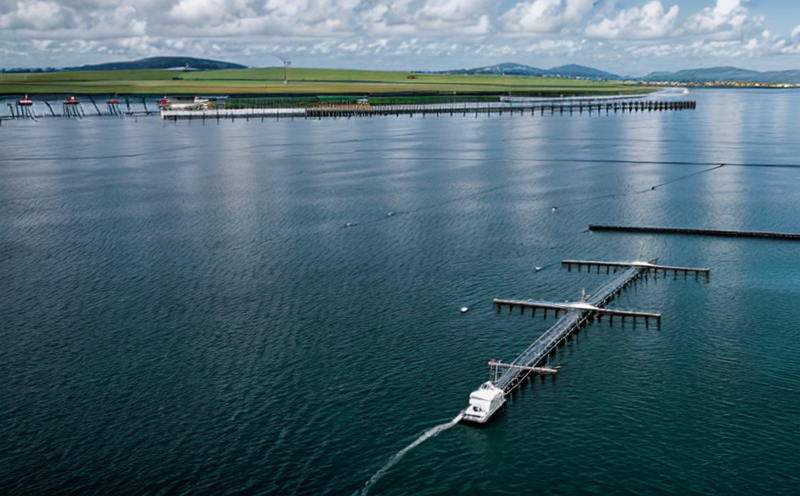
-
Energy and Sustainability Standards-
Energy Sustainability in Agriculture-
Energy Efficiency in Aquaculture Operations
We provide comprehensive solutions designed to help our clients mitigate risks, enhance performance, and excel in key areas such as quality, health & safety, environmental sustainability, and social responsibility.
Discover
For many years, our organization has been operating successfully, boasting modern laboratories that meet international standards. These laboratories are equipped with the latest technology devices and equipment, and we have built a strong team of experienced and trained personnel to operate them.
DiscoverWelcome to Eurolab, your partner in pioneering solutions that encompass every facet of life. We are committed to delivering comprehensive Assurance, Testing, Inspection, and Certification services, empowering our global clientele with the ultimate confidence in their products and processes.
Discover
-
Energy and Sustainability Standards-
Energy Sustainability in Agriculture-
Energy Efficiency in Aquaculture OperationsAquaculture is a growing sector that plays a significant role in meeting global food demand. As the world's population continues to rise, aquaculture's contribution to sustainable food production becomes increasingly vital. However, aquaculture operations, which involve the farming of aquatic organisms such as fish, shellfish, and algae, can be energy-intensive. From water circulation and oxygenation to heating and lighting, energy consumption in aquaculture operations can result in high costs and environmental impacts.
Improving energy efficiency in aquaculture is crucial for reducing operational costs, minimizing the carbon footprint, and enhancing the sustainability of the industry. By adopting best practices and technologies that promote energy conservation, aquaculture operations can improve their environmental performance while maintaining productivity.
This overview explores the importance of energy efficiency in aquaculture, key energy-saving practices, technologies, benefits, challenges, and examples of standards guiding energy use in the aquaculture industry.
The implementation of energy efficiency practices in aquaculture is essential for several reasons:
1. Optimized Water Circulation and Aeration Systems
2. Renewable Energy Integration
3. Energy-Efficient Heating and Cooling Systems
4. Efficient Lighting Systems
5. Monitoring and Automation Systems
1. Cost Savings
2. Environmental Sustainability
3. Regulatory Compliance
4. Improved Productivity and Farm Efficiency
Despite the numerous benefits, there are challenges to adopting energy-efficient practices in aquaculture:
1. High Initial Costs
2. Technological Barriers
3. Geographic Limitations
Energy efficiency is a key component of sustainable aquaculture operations. By adopting best practices, integrating renewable energy sources, and utilizing energy-efficient technologies, aquaculture farms can reduce costs, improve environmental sustainability, and enhance operational performance. While challenges such as initial costs and technological complexity may exist, the long-term benefits of energy efficiency make it a crucial area of focus for the future of the aquaculture industry.

MDR Testing and Compliance
MDR Testing and Compliance: A Comprehensive Guide The Medical Device Regulation (MDR) is a comprehe...

NEBS and Telecommunication Standards
Network Equipment Building System (NEBS) and Telecommunication Standards The Network Equipment Bu...

Healthcare and Medical Devices
The Evolution of Healthcare and Medical Devices: Trends, Innovations, and Challenges The healthcare...

Consumer Product Safety
Consumer Product Safety: Protecting Consumers from Harmful Products As a consumer, you have the rig...

Lighting and Optical Device Testing
Lighting and Optical Device Testing: Ensuring Performance and Safety Lighting and optical devices a...

Pressure Vessels and Installations Testing
Pressure Vessels and Installations Testing Pressure vessels are a critical component of various ind...

IT and Data Center Certification
IT and Data Center Certification: Understanding the Importance and Benefits The field of Informatio...

Food Safety and Testing
Food Safety and Testing: Ensuring the Quality of Our Food As consumers, we expect our food to be sa...

Hospitality and Tourism Certification
Hospitality and Tourism Certification: Unlocking Opportunities in the Industry The hospitality and ...

Cosmetic Product Testing
The Complex World of Cosmetic Product Testing The cosmetics industry is a multi-billion-dollar ma...

Environmental Impact Assessment
Environmental Impact Assessment: A Comprehensive Guide Environmental Impact Assessment (EIA) is a c...

Product and Retail Standards
Product and Retail Standards: Ensuring Quality and Safety for Consumers In todays competitive marke...

Energy and Sustainability Standards
In today’s rapidly evolving world, businesses face increasing pressure to meet global energy a...

Construction and Engineering Compliance
Construction and Engineering Compliance: Ensuring Safety, Quality, and Regulatory Adherence In the ...

Transportation and Logistics Certification
Transportation and Logistics Certification: A Comprehensive Guide The transportation and logistics ...

Trade and Government Regulations
Trade and government regulations play a vital role in shaping the global economy. These regulations ...

Battery Testing and Safety
Battery Testing and Safety: A Comprehensive Guide As technology continues to advance, battery-power...

Aviation and Aerospace Testing
Aviation and Aerospace Testing: Ensuring Safety and Efficiency The aviation and aerospace industr...

Electromechanical Safety Certification
Electromechanical Safety Certification: Ensuring Compliance and Protecting Lives In todays intercon...

Automotive Compliance and Certification
Automotive Compliance and Certification: Ensuring Safety and Efficiency The automotive industry is ...

Industrial Equipment Certification
Industrial equipment certification is a critical process that ensures industrial equipment meets spe...

Chemical Safety and Certification
Chemical safety and certification are critical in ensuring the safe management of products and proce...

Electrical and Electromagnetic Testing
Electrical and Electromagnetic Testing: A Comprehensive Guide Introduction Electrical and electrom...

Pharmaceutical Compliance
Pharmaceutical compliance refers to the adherence of pharmaceutical companies and organizations to l...

Environmental Simulation Testing
Environmental Simulation Testing: A Comprehensive Guide In todays world, where technology is rapidl...

Military Equipment Standards
Military Equipment Standards: Ensuring Effectiveness and Safety The use of military equipment is a ...

Fire Safety and Prevention Standards
Fire Safety and Prevention Standards: Protecting Lives and Property Fire safety and prevention stan...

Renewable Energy Testing and Standards
Renewable Energy Testing and Standards: Ensuring a Sustainable Future The world is rapidly transiti...

Railway Industry Compliance
Railway Industry Compliance: Ensuring Safety and Efficiency The railway industry is a critical comp...

Agricultural Equipment Certification
Agricultural equipment certification is a process that ensures agricultural machinery meets specific...